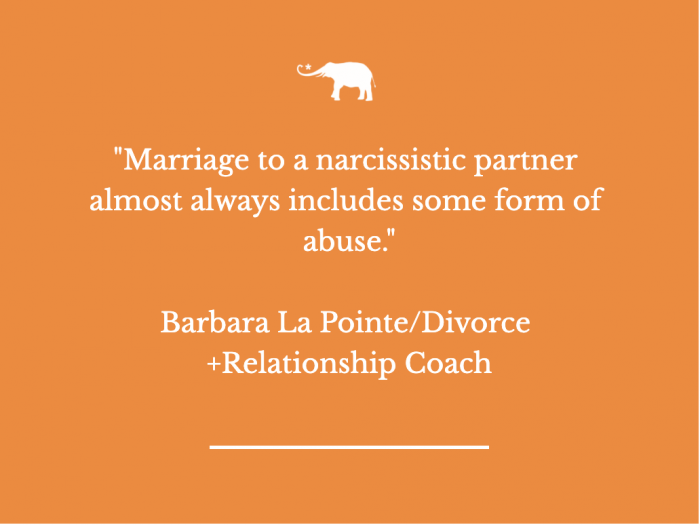Marriage to a narcissistic partner almost always includes some form of abuse. Emotional abuse, psychological abuse, financial abuse, physical or even sexual abuse often occur. Because of this, when it comes to getting a divorce from a narcissistic partner, abuse is generally heightened as the relationship turns into a “fight to the death” kind of battle. If you think you were walking on eggshells around a narcissist during the marriage, you will find running away from them on eggshells is even more challenging. Statistically, more men than women have NPD or narcissistic personality disorder, by a two to one ratio. Also, almost 70% of divorces are initiated by women across North America. But there are women narcissistic partners who are equally abusive in their marriages, and also in the divorce process.
Narcissists Are Always the Victim
The core of the issue is that people with NPD never take responsibility for their actions, and they are capable of a vast array of tactics to shift the blame to their partner, through lies, attacking, gaslighting and manipulation. They are clever at making themselves out to be the victim while they launch attacks on their partners.
Narcissists Have No Emotional Empathy
Part of the NPD disorder is a complete lack of empathy. The narcissist can reduce their partner and their children to tears and keep going like a freight train with no brakes. They are un-moved by tears, by pleas, sobbing, and are enraged if their partner or children try to flee the emotionally upsetting incident. Because it is all about them.
Narcissists Are Always Right
No one ever wins an argument with narcissists. They are certain of their point of view and every other opinion is the wrong one. This is an absolute rule. The ego of the narcissist maintains this absolute certainty of rightness to hide a deep insecurity. The narcissist cannot entertain the idea of being “wrong.” So therefore, he or she is always right.
Narcissists Are Hierarchial
For narcissists, life is a ladder. Other people are either one step above them on the ladder, or several steps below. But no one is on the same rung. No one is their equal. Because the divorce process theoretically is intended to treat each partner with equal justice and fairness, this is unacceptable to the narcissist. There can be no such thing as a “fair” divorce. Narcissists must gain and maintain superiority somehow and will do whatever it takes to maintain their power.
Unfortunately, the children often become the best way for them to achieve that goal. And as they lack empathy, they are oblivious to the pain and damage to their children who become the battleground for their pursuit of power.
So What Can You Expect If You Are Getting A Divorce From A Narcissist?
In their 2016 article in Psychology Today, 13 Essential Tips if You Are Divorcing a Narcissist, authors Craig Malkin, Ph.D., a psychologist, author and lecturer at Harvard Medical School, and Mary G. Kirkpatrick, a trial lawyer who has worked with experts on personality disorders, have assembled a helpful list of what you need to expect.
Here are a few of their tips:
1. The narcissist is “in it to win it”. In other words, they must prove that they are right, no matter what it takes, how long it takes, or how much money it takes.
2. He or she will play games. They will maintain power and advantage by keeping the other person off balance. They also know how to “game” the court system to their advantage. Unfortunately, this often works. They will file endless motions and accusations of “neglectful parenting,” all in an attempt to wear down the other person.
3. They do not tally emotional losses. Because of their lack of empathy, narcissists are not keeping track of how many times their partner or children are upset. Experts say the narcissist prefers to pursue a “scorched earth policy,” even if that means causing enormous harm to his or her children.
4. The court battle is a narcissist’s way of using you to feel powerful. What better way to “prove” he or she is right than to have a judge declare this. A narcissist does not care how long the court proceedings take. As Malkin says, “It’s a way of staying connected to you.” They do not want to become a nobody in your eyes.
5. They want you to capitulate and leave the divorce with a “trophy”. Whether this is disputed property, assets, or the custody arrangement, the narcissist needs to have a symbolic trophy. This is why they will change the nature of the divorce by being obstructive, requesting delays of court meetings, lying in court documents, not attend court meetings.
6. They refuse to negotiate in a fair manner. Since there is no such thing a “middle ground” for a narcissist, negotiation is nearly impossible. You will need a highly skilled lawyer.
7. Communication is extremely difficult. Communication between you and your ex, between your lawyer and the other lawyer – these will be fraught with challenges. It is part of the obstruction strategy.
How Can You Prepare For This Battle?
1. Find an experienced lawyer. Mary Kirkpatrick, a trial lawyer who has handled complicated divorce cases advises you to inform your divorce lawyer of what they will be up against. Narcissists usually present themselves as calm, rational, well-spoken, and reasonable people. But then the dark side appears. Try to find a divorce lawyer who has had some experience dealing with a narcissist.
2. Keep copies of everything. This includes all expenditures, receipts, schedules, emails, texts, physical mail, bank statements. You will need to provide evidence for your side of the case.
3. Do not stoop to their level. Do your best to stay cool and calm when replying to texts, phone calls, letters, emails. Do not give the narcissist any ammunition to accuse you of being irrational, hostile, or coming unglued. Avoid falling into their traps. Stick to the strategy you and your lawyer develop. Do not make comments about your spouse in front of your kids either. They will get back to the spouse and fuel retaliation.
4. Get a therapist, for you and possibly for the children although that might be a challenge if there is a custody battle ongoing. You need to take good care of your mental, emotional, and physical health during this season. Your lawyer is not a therapist, so find someone who can give you that support.







Read 0 comments and reply